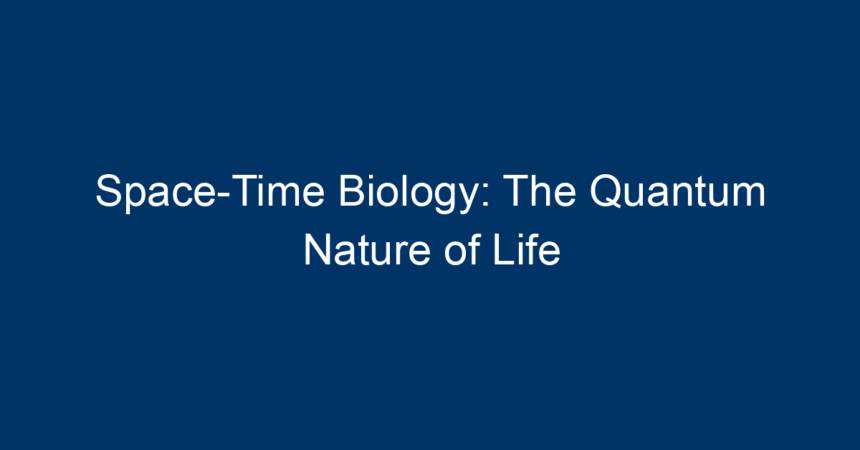In the intricate tapestry of life, the realms of biology, physics, and quantum mechanics intersect in unexpected and profound ways. Space-time biology seeks to understand these intersections, uncovering how quantum processes may shape life itself. As science progresses, bridging the gap between the macroscopic biological phenomena we observe daily and the subtle quantum mechanics of particles becomes increasingly critical. This article dives deep into the fascinating world of space-time biology, exploring its implications for our understanding of life and consciousness.
What is Space-Time Biology?
At its core, space-time biology examines how the fundamental principles of space and time, combined with quantum mechanics, influence biological processes. Traditional biology often focuses on genetics, evolution, and ecology, but incorporating principles from physics introduces a new dimension. This emerging field prompts us to ask questions like:
- How do quantum processes affect cellular function?
- Can understanding space-time leads us to insights about consciousness?
- What implications does this have for the future of medicine?
The Quantum Foundations of Life
Understanding Quantum Mechanics
Before delving into the specifics of space-time biology, it’s essential to grasp the basics of quantum mechanics. Quantum mechanics describes the behavior of matter and energy at the smallest scales. Unlike classical physics, where particles have well-defined positions and velocities, quantum particles exhibit uncertainty and can exist in multiple states simultaneously.
Quantum Coherence in Biological Systems
Recent research has suggested that some biological processes—like photosynthesis—are influenced by quantum mechanics. In plants, energy transfer during photosynthesis occurs with remarkable efficiency, which may be partly due to quantum coherence. This phenomenon allows particles to interact in ways that optimize energy usage.
Space-Time: The Fabric of Our Universe
Understanding space-time is crucial for understanding how life operates on a quantum level. Space-time, a concept merging the three dimensions of space with the one dimension of time, provides a framework for understanding how entities interact at cosmic scales.
Time’s Role in Biological Processes
Time isn’t just a backdrop for events; it’s integral to biological rhythms. Circadian rhythms, for instance, govern numerous processes in living organisms—from sleep-wake cycles to metabolic processes. Research into space-time biology explores how quantum principles can influence these rhythms in ways that aren’t yet fully understood.
The Intersection of Biology and Quantum Mechanics
Quantum Events in Cells
The field of space-time biology investigates how quantum events support cellular functions. For instance, the behavior of electrons during cellular respiration can be viewed through a quantum lens. Understanding these interactions may reveal new insights into metabolic disorders or age-related diseases.
Consciousness and Quantum Processes
One of the more controversial yet captivating branches of space-time biology concerns consciousness. Some theorists propose that consciousness itself may have a quantum basis, allowing for interconnectedness among all living beings. This perspective challenges traditional views of mind and matter, suggesting that consciousness influences physical reality.
Implications for Medicine and Health
With the insights gained from studying space-time biology, the potential applications in the medical field are immense.
Quantum Medicine
Quantum medicine posits that by understanding how quantum processes affect biological systems, we can develop more effective treatments. For instance, quantum-based imaging techniques may revolutionize diagnostics, while precision medicine can be enhanced by tailoring treatments based on individual quantum biological characteristics.
Regenerative Medicine
Exploring the quantum aspects of cellular behavior may propel advancements in regenerative medicine. By harnessing quantum properties, scientists may be able to stimulate cellular repair processes or enhance the growth of tissues and organs.
The Challenges Ahead
Despite the immense promise of space-time biology, several challenges exist:
- Interdisciplinary Nature: Bridging the gap between biology and quantum physics requires collaboration among diverse scientific disciplines.
- Experimental Validation: Many theories in quantum biology remain largely theoretical; extensive experimental validation is necessary to confirm these ideas.
- Public Perception: The integration of quantum concepts into biology can lead to misunderstandings, necessitating clear communication about the science involved.
Actionable Insights for Future Explorations
For those interested in the future of space-time biology, several pathways can lead to fruitful exploration:
- Stay Informed: Keep up with the latest research by following scientific journals focusing on quantum biology, physics, and interdisciplinary studies.
- Engage in Dialogues: Participate in forums and discussions that explore the crossover of biology and quantum mechanics, fostering a broader understanding of these concepts.
- Explore Education: For those interested in pursuing careers in this field, consider interdisciplinary programs that combine biology, physics, and mathematics.
Conclusion: Embracing the Quantum Nature of Life
The field of space-time biology opens a portal into understanding life at its most fundamental level, challenging our perceptions and expanding our horizons. As we continue to unravel the complexities of life through the lens of quantum mechanics, the potential for discovery is limitless. Whether it leads to revolutionary medical breakthroughs, a deeper understanding of consciousness, or even a new appreciation for the interconnectedness of all living things, space-time biology holds the key to a more profound understanding of existence itself.
As science ventures further into this uncharted territory, it invites all of us to ponder the nature of our reality, offering insights not only into biology but into the very nature of life and consciousness.




